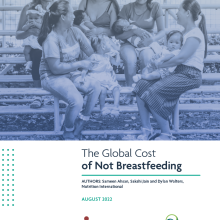Journal article
Jan 13 2023

Differences in the Microbiological Profile of Raw and Pasteurized Breastmilk from Hospital and Community-Based Donors at the First Human Milk Bank in Vietnam (Tran HT, Nguyen TT, et al, Nutrients. 2023)
Microbiological quality is one of the key safety standards in human milk bank operations.
Journal article
Jan 10 2023

The Financial Costs of Mass Media Interventions Used for Improving Breastfeeding Practices in Bangladesh, Burkina Faso, Nigeria, and Vietnam (Sanghvi T.G., et al, 2022)
This analysis documents the financial costs and budgetary needs for implementing mass media components of large-scale breastfeeding programs, providing annual costs, cost structures, and coverage achieved through mass media interventions in four low- and middle-income countries.
Journal article
Nov 15 2022

Multiple modifiable maternal, household and health service factors are associated with maternal nutrition and early breastfeeding practices in Burkina Faso (Kim Sunny S, Ouédraogo C, 2022, Mat & Child Nutrition)
This study identified factors that can be modified by interventions at the individual, household and health service levels to improve maternal nutrition and breastfeeding practices in Burkina Faso: High maternal knowledge was an important factor for maternal dietary diversity, breastfeeding and I
Journal article
Oct 08 2022

Birth and newborn care policies and practices limit breastfeeding at maternity facilities in Vietnam
The prevalence of early and exclusive breastfeeding in Vietnam remains sub-optimal. The objective of this study was to determine factors associated with early initiation of breastfeeding (EIBF) and exclusive breastfeeding for the first 3 days after birth (EBF3D).
Brief
Sep 26 2022

The new Cost of Not Breastfeeding: Global advocacy brief
This brief by Nutrition International and Alive & Thrive provides key findings from the updated and expanded Cost of Not Breastfeeding tool, including summaries of the costs by region and country case studies for China,
Journal article
Sep 01 2022

Implementation and Effectiveness of Policies Adopted to Enable Breastfeeding in the Philippines Are Limited by Structural and Individual Barriers
The Philippines has adopted policies to protect, promote, and support breastfeeding on par with global standards, yet the impact of these policies is not well understood.

